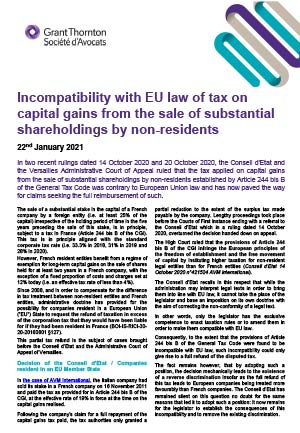-
Tax Policy Management
Tax Policy Management
-
Growth Management
Growth Management
-
Tax audit and litigation
Tax audit and litigation

-
Definition of a strategic and secure transfer pricing structure
Definition of a strategic and secure transfer pricing structure
-
Assistance in the development of international activities and operational reorganisations – “Business restructuring”
Assistance in the development of international activities and operational reorganisations – “Business restructuring”
-
Defense of practices and assistance in the context of tax audits and their follow-up from a litigation viewpoint
Defense of practices and assistance in the context of tax audits and their follow-up from a litigation viewpoint
-
Annual declaration and documentation obligations
Annual declaration and documentation obligations

-
Domestic and international VAT applicable to your company's flow
Domestic and international VAT applicable to your company's flow
-
Banking and financial VAT, VAT in the insurance sector
Banking and financial VAT, VAT in the insurance sector
-
VAT related to real estate registration fees
VAT related to real estate registration fees
-
VAT in the public and non-profit / association sector
VAT in the public and non-profit / association sector
-
Tax audit, tax litigation and relations with the Tax authorities
Tax audit, tax litigation and relations with the Tax authorities
-
Applicable rules for invoicing
Applicable rules for invoicing
-
Customs issues related to your company's international flows
Customs issues related to your company's international flows
-
French VAT registration and compliance obligations
French VAT registration and compliance obligations
-
Payroll tax
Payroll tax
-
Other indirect taxation
Other indirect taxation

-
Company transfer diagnosis
Company transfer diagnosis

-
Distribution strategy : Implementing and structuring
Distribution strategy : Implementing and structuring
-
Distribution activities digitalisation
Distribution activities digitalisation
-
Relations between suppliers and distributors
Relations between suppliers and distributors
-
Contractual policy : etablishing and structuring
Contractual policy : etablishing and structuring
-
Controls and litigation regarding payment terms
Controls and litigation regarding payment terms
-
Organising and securing commercial relations with consumers
Organising and securing commercial relations with consumers
-
Data protection - GDPR
Data protection - GDPR
-
Commercial Leases
Support in the management and contract management of commercial leases.

-
Traditional Services offered
Traditional Services offered
-
Health at work and quality of life at work
Health at work and quality of life at work
-
HR Management Audit
HR Management Audit
-
HR Engineering and People Change
Implementing managerial solutions in line with the company's strategic challenges
-
Management of HR compliance and internal investigations (harassment, discrimination, and whistleblowing)
Management of HR compliance and internal investigations (harassment, discrimination, and whistleblowing)

-
Advice on legal structuring
Advice on legal structuring
-
Day to day company management
Day to day company management
-
Companies reorganisation
Companies reorganisation
-
Mergers & Acquisitions - Private Equity
Mergers & Acquisitions - Private Equity
-
Changes in shareholder structure - Securities issue
Changes in shareholder structure - Securities issue
-
Governance and legal risks management
Governance and legal risks management

-
Development of an international mobility policy
Development of an international mobility policy
-
Coordination of reporting obligations for employees in a mobility situation
Coordination of reporting obligations for employees in a mobility situation
-
Advice on social security
Advice on social security
-
Assistance in labour law
Assistance in labour law

-
Management and protection of your portfolio of property rights
We put the most appropriate protection policy in place for our clients’ intellectual property rights.
-
Securing your projects: advisory and drafting of agreement services
We advise you on the feasibility of your project and the securing of your intellectual property and IT rights.
-
Enforcement of your rights: pre-litigation and litigation
Enforcement of your rights: detection of infringement, pre-litigation and litigation

From the sale of substantial shareholdings by non-residents
Incompatibility with EU law of tax on capital gains from the sale of substantial shareholdings by non-residents
In two recent rulings dated 14 October 2020 and 20 October 2020, the Conseil d'Etat and the Versailles Administrative Court of Appeal ruled that the tax applied on capital gains from the sale of substantial shareholdings by non-residents established by Article 244 bis B of the General Tax Code was contrary to European Union law and has now paved the way for claims seeking the full reimbursement of such.
The sale of a substantial stake in the capital of a French company by a foreign entity (i.e. at least 25% of the capital) irrespective of the holding period of time in the five years preceding the sale of this stake, is in principle, subject to a tax in France (Article 244 bis B of the CGI). This tax is in principle aligned with the standard corporate tax rate (i.e. 33.3% in 2018, 31% in 2019 and 28% in 2020).
However, French resident entities benefit from a regime of exemption for long-term capital gains on the sale of shares held for at least two years in a French company, with the exception of a fixed proportion of costs and charges set at 12% today (i.e. an effective tax rate of less than 4%).
Since 2008, and in order to compensate for the difference in tax treatment between non-resident entities and French entities, administrative doctrine has provided for the possibility for companies resident in a European Union ("EU") State to request the refund of taxation in excess of the corporation tax that they would have been liable for if they had been resident in France (BOI-IS-RICI-30-20-20180801 §127).
This partial tax refund is the subject of cases brought before the Conseil d’Etat and the Administrative Court of Appeal of Versailles.
Decision of the Conseil d’Etat / Companies resident in an EU Member State
In the case of AVM International, the Italian company had sold its stake in a French company on 16 November 2011 and paid the tax as provided for in Article 244 bis B of the CGI, at the effective rate of 19% in force at the time on the capital gains realised.
Following the company's claim for a full repayment of the capital gains tax paid, the tax authorities only granted a partial reduction to the extent of the surplus tax made payable by the company. Lengthy proceedings took place before the Courts of First Instance ending with a referral to the Conseil d’Etat which in a ruling dated 14 October 2020, overturned the decision handed down on appeal.
The High Court ruled that the provisions of Article 244 bis B of the CGI infringe the European principles of the freedom of establishment and the free movement of capital by instituting higher taxation for non-resident legal entities than for French entities (Conseil d'Etat 14 October 2020 n°421524 AVM international).
The Conseil d’Etat recalls in this respect that while the administration may interpret legal texts in order to bring them into line with EU law, it cannot take the place of the legislator and base an imposition on its own doctrine with the aim of correcting the non-conformity of a legal text.
In other words, only the legislator has the exclusive competence to enact taxation rules or to amend them in order to make them compatible with EU law.
Consequently, to the extent that the provisions of Article 244 bis B of the General Tax Code were found to be incompatible with EU law, such incompatibility could only give rise to a full refund of the disputed tax.
The fact remains however, that by adopting such a position, the decision mechanically leads to the existence of a reverse discrimination insofar as the full refund of this tax leads to European companies being treated more favourably than French companies. The Conseil d’Etat has remained silent on this question no doubt for the same reasons that led it to adopt such a position: it now remains for the legislator to establish the consequences of this incompatibility and to remove the existing discrimination.
Potential extension to companies' resident outside the EU / Decision of the Administrative Court of Appeal of Versailles
The question of applying the position established by the Conseil d’Etat in its decision regarding AVM International to other foreign entities resident in non-EU countries could as a consequence be raised.
Indeed, contrary to the principle of a freedom of establishment, the principle of a free movement of capital is intended to apply not only to that between EU Member States, but also to that between Member States and non-member countries.
This question was decided by the Administrative Court of Appeal of Versailles which recently granted the application for a full refund of the tax filed by a company located in the Cayman Islands (CAA Versailles 20 October 2020 n°18VE03012 Runa Capital Fund I LP).
The ruling handed down by the Administrative Court of Appeal of Versailles is of particular interest insofar as it essentially raised the question of the application of the standstill clause which authorises Member States where direct investments are held, to maintain the discrimination that has existed uninterruptedly since 31 December 1993. It therefore remained to be seen whether Article 244 bis B of the CGI was prior to 31 December 1993.
The Administrative Court of Appeal of Versailles replied in the negative, considering that Article 244 bis B only provides for a tax on legal persons or entities regardless of their legal form since the amended finance law for 1993. However, this law did not come into force until 2 January 1994.
The Court concluded that since the tax introduced by Article 244 bis B of the General Tax Code has not in fact existed uninterruptedly since 31 December 1993, the standstill clause is not applicable.
The Administrative Court of Appeal of Versailles consequently considered that the tax paid by the company based in the Cayman Islands should be refunded to it in full.
Opportunities resulting from the decisions
These two rulings open up a wide range of opportunities for both European entities and entities resident outside the EU to file claims in court.
Entities resident in a State of the European Union:
In application of the case law of AVM International, such companies will now be able to:
- to dispense with the payment of the tax;
- request the full refund of this tax paid in 2019 and 2020 by way of a claim provided that such claims are made no later than 31 December 2021 and 2022 respectively.
- request a full refund by means of a litigation of the outstanding amount for those who have paid the tax as of 1 January 2019 and who have obtained only the partial refund.
Entities resident outside the EU
These entities may file a litigation on the basis of the Runa Capital Fund case law in order to request a refund of the total amount of the tax paid, and this under the same time limit conditions as EU resident entities.
Lastly, and even if the success of such procedures is more uncertain, French companies that have sold a stake and paid corporate income tax on the 12% share of costs and expenses may consider filing a preliminary claim for the reimbursement of such pending a ruling on whether or not reverse discrimination exists in such a case.
The filing of a preliminary claim is necessary in order to avoid the limitation of the right to restitution within the previously mentioned time limits.
Our firm is at your disposal to assist you in this process and optimise your chances of obtaining these refunds. Do not hesitate to contact us for any further information you may require.
Author: Patricia Malocco, Senior Manager, Attorney-at-law.















